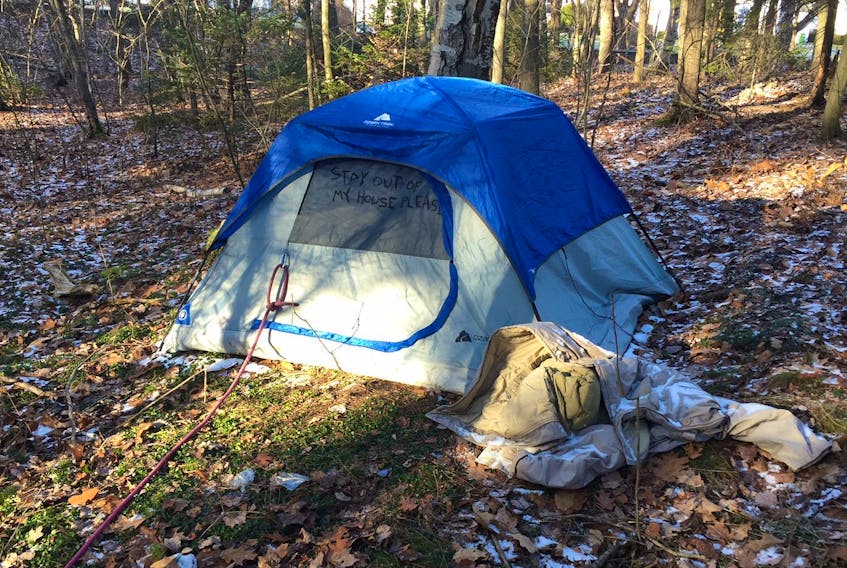The population of Halifax Regional Municipality is growing steadily and its homeless numbers seem to be on the rise, too.
“There has been an uptick in people sleeping rough in parks and green spaces and private property,” said Coun. Waye Mason (Halifax South-Downtown). “I’ve certainly had reports from residents in Gorsebrook Park, people have been sleeping on benches in Cornwallis Park this summer and a couple of other green spaces along Barrington Street.”
Mason said a municipal bylaw clearly states that camping is not allowed in parks and people have been moved along from parks and benches.
“The flipside is what if there is nowhere to go,” he said.
The Halifax Point in Time count, a snapshot of homelessness that is part of a federally funded data collection project held in communities across the country, counted 220 homeless individuals over a 24-hour period on April 24 of this year in the urban core of the Halifax peninsula. The survey included engagement on the street, at seven shelters, two non-shelter service providers and the central library on Spring Garden Road. The count was not significantly different than in previous years.
A Point in Time survey taken in Cape Breton Regional Municipality on April 15, 2016, counted 137 homeless people.
“There seems to be two things going on,” Mason said. “One is that we seem to have more people coming in just for the summer than we used to have who seem to like to sleep rough and I’ve heard, but I don’t have this confirmed, that the shelters have been at capacity during the summer, which they haven’t been previously.”
Shelter Nova Scotia operates the 55-bed Metro Turning Point for men on Barrington Street and the 20-bed Barry House for women on Gottingen Street. Executive director Linda Wilson said nothing has changed at the shelters.
“We are always full and we always have been full,” she said.
An employee at the Halifax Centre for Hope, the Salvation Army shelter for men on Gottingen Street, said “usually every night,” it is filled up with about 60 or 70 people seeking emergency shelter.
“The shelter capacity hasn’t gone down but I think the number of people looking for shelter has definitely gone up,” Mason said, adding that people sleeping rough are directed to the Navigator Street Outreach, which provides homeless people with support to secure and maintain employment and housing.
“We’re at the sharp end,” Mason said. “The street navigator is owned by the city, the parks are owned by the city, the police are paid by the city, the bylaws are by the city. Housing and everything to do with homelessness and shelter is provincial.”
A spokeswoman for the provincial Community Services Department said government is committed to working with homelessness service providers through the department and Housing Nova Scotia.
Shannon Kerr said in an email that in addition to approximately $7.6 million in annual funding for homeless shelters, the government has approved $15,000 for extreme weather response through the Halifax Housing and Homelessness Partnership, increased funding for the Out of the Cold shelter in Halifax by $15,500 to hire an additional staff person and to extend its season, and provided $296,552 in partnership with Salvation Army to pilot a Rapid Rehousing Program for men experiencing homelessness.
Kerr said government also announced a personal items allowance effective Oct. 1 that will provide $101 monthly for recipients who are temporarily staying in homeless shelters or transition houses to help pay for personal hygiene and other items not provided by the shelters.
Brandon Grant, executive director of employment supports and income assistance under the Community Services Department, said the province provides funding for homelessness through a couple of routes, including the $7.6-million shelter funding and another million dollars to fund a number of initiatives, including housing support workers and rent supplement.
Grant said the department works on a number of other community housing efforts and recently teamed with the Cape Breton Community Housing Association to provide a co-ed shelter there.
People come to emergency shelters for a variety of reasons, he said.
“We want to make sure … that we have something available so that people have a safe and clean place to stay overnight," Grant said. "Our focus is working with communities over the last couple of years to make sure that the system is responding to the needs of Nova Scotians who access homeless shelters.
“We want to make sure that if you are accessing a shelter that your stay is as short and as dignified as possible and ultimately the goal is to find permanent housing for you outside of the shelter.”
At least one person didn’t appear to have accessed a shelter overnight Wednesday. A small Ozark Trail tent sat just dozens of metres behind the municipal parks building in Point Pleasant Park. Some camping gear lay beside the tent that sported a scribbled sign reading “Stay out of my house, please.” A leash attached to the tent extended back into the woods toward a park trail.
As with any incident, police would would evaluate such situations on a case-by-case basis, said Const. John MacLeod, spokesman for Halifax Regional Police.
“Activities in Point Pleasant Park are regulated by Bylaw P-600," MacLeod said. That bylaw states that camping is prohibited in the park.
“Officers would take into consideration all pertinent factors in determining if an offence had taken place," MacLeod said. "Public safety and the well-being of any involved individuals would be the primary focus and would guide their actions."
Mason said the Mobile Outreach Street Health unit that provides primary health-care services to the homeless or the insecurely housed in the municipality was very busy last winter, especially during an extended stretch of bitterly cold weather.
“We haven’t lost anybody during the summer during the heat wave and haven’t lost anybody in the winter, but it’s something that is constantly on our mind,” he said.
Mason said anyone who sees a person camped out or sleeping rough in the municipality should contact him or other area councillors or contact Halifax Regional Police by their non-emergency number.









